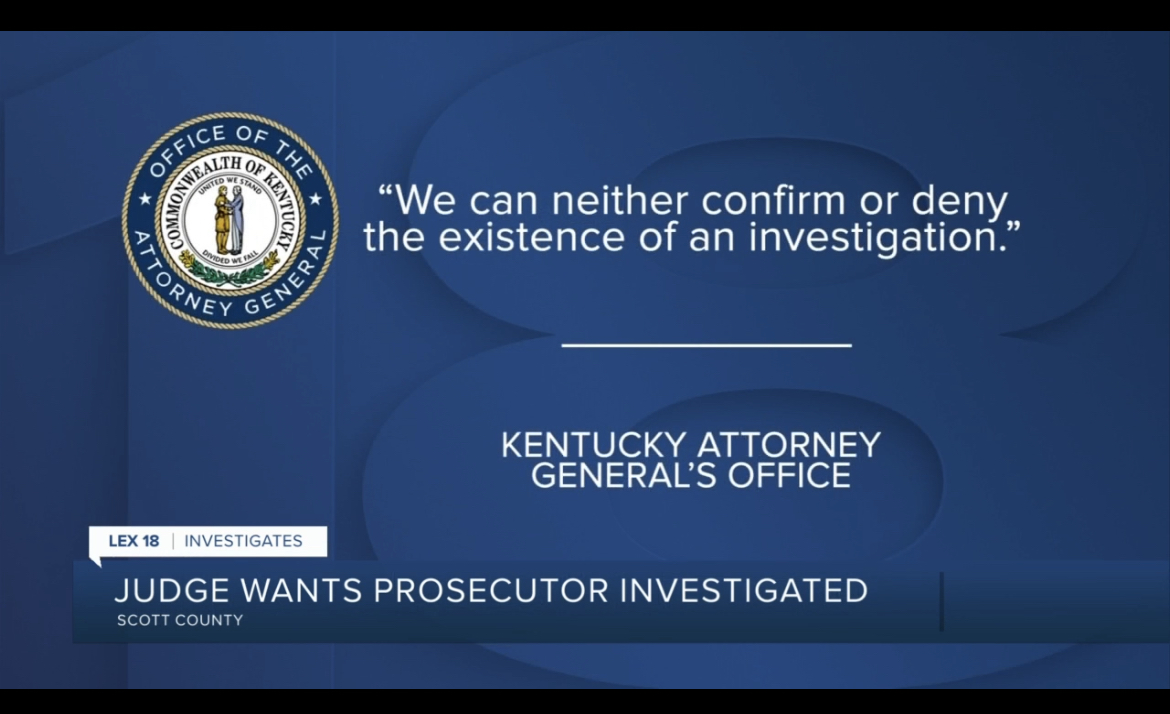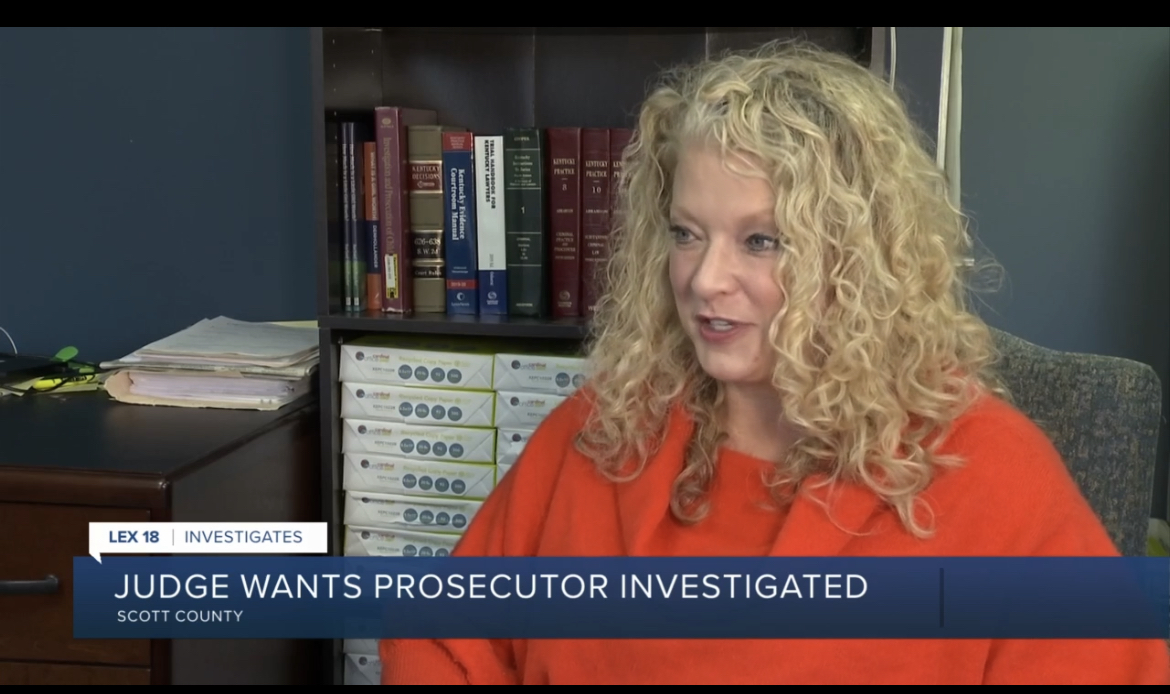

Open records figures prominently in a recent Courier Journal article focusing on an ongoing investigation conducted by the office of Attorney General Daniel Cameron into a Commonwealth’s Attorney who may one day have her own reality TV show. WLEX has also reported on the story.
https://www.lex18.com/news/lex-18-investigates/letter-accuses-kentucky-…
Reporter Joe Sonka writes:
“A Kentucky Circuit Court judge has asked the state Attorney General's office to investigate the commonwealth's attorney in his judicial district, accusing the prosecutor of abusing her office and engaging in conduct that was ‘unprofessional, unethical, and possibly criminal.’
“A spokesperson for Attorney General Daniel Cameron said his office does not comment on investigations, but a response to a Courier Journal open-records request suggested an inquiry was already underway involving the office of Sharon Muse-Johnson — the commonwealth's attorney for the 14th circuit district, comprised of Bourbon, Scott, and Woodford counties.
“Asked last month for a copy of any formal complaint to investigate Muse, Cameron's office replied that two pages of responsive records existed but were exempt from production under the state open records law because they ‘contain information which, if disclosed, would harm an ongoing investigation in this office.’
“The attorney general's office added the disclosure would harm the investigation ‘by revealing the identity of informants not otherwise known and by premature release of information to be used in a prospective law enforcement action or administrative adjudication.’
“The Courier Journal independently obtained a copy of Privett's two-page letter dated Dec. 16 to Greg Wolf — commissioner of the attorney general's criminal investigations department — alleging the judge had ‘observed some very concerning actions on the part of Sharon Muse-Johnson.’”
This would be a standard “agency denies records request” story, but for Sonka’s recitation of the legal argument advanced by the attorney general in support of the denial (and the bizarre nature of the allegations against the Commonwealth’s Attorney).
The AG cites the familiar “law enforcement” exception, KRS 61.878(1)(h). The exception applies to “records of law enforcement agencies or agencies involved in administrative adjudication that were compiled in the process of detecting and investigating statutory or regulatory violations if the disclosure of the information would harm the agency by revealing the identity of informants not otherwise known or by premature release of information to be used in a prospective law enforcement action or administrative adjudication.”
https://apps.legislature.ky.gov/law/statutes/statute.aspx?id=51393
In spite of the fact that the Kentucky Supreme Court has made abundantly clear in multiple opinions that in order to successfully invoke the exception, the agency “must show (1) that the records to be withheld were compiled for law enforcement/administrative adjudication purposes; (2) that a law enforcement action/administrative adjudication is prospective; and (3) that premature release of the records would harm the agency in some articulable way,” public agencies continue to casually invoke it to delay access to all open investigation files.
KRS 61.&78(1)(h) “is appropriately invoked only when the agency can articulate a factual basis for applying it, only, that is, when, because of the record's content, its release poses a concrete risk of harm to the agency in the prospective action. A concrete risk, by definition, must be something more than a hypothetical or speculative concern.”
https://casetext.com/case/city-of-fort-thomas-v-cincinnati-enquirer#p852
Indeed, the exception itself expressly states that it “shall not be used by the custodian of the records to delay or impede the exercise of rights granted by” the open records laws. It is the only exception that contains this language — on top of the general requirement that all exceptions be strictly construed.
https://apps.legislature.ky.gov/law/statutes/statute.aspx?id=23058
Records legitimately excepted under the “law enforcement” exception are “open after enforcement action is completed or a decision is made to take no action.”
Sonka states that Cameron explained that the records Sonka requested “contain information which, if disclosed, would harm an ongoing investigation in this office” and that “disclosure would harm the investigation ‘by revealing the identity of informants not otherwise known and by premature release of information to be used in a prospective law enforcement action or administrative adjudication.’”
If Sonka’s description reflects the sum total of the attorney general’s explanation for denial, it is little more than a recitation of the exception and nothing like “a factual basis for applying it,” based on the record’s content. It is by no means “a concrete risk [which], by definition, must be something more than a hypothetical or speculative concern.”
On this basis alone, the attorney general’s denial is unsustainable. It could not be affirmed on appeal.
Interestingly, KRS 61.878(1)(i) and (j) have regularly been invoked by public agencies to deny access to complaints/initiating documents in agency investigations until final action is taken, including a decision to take no action. Records protected by these exceptions, referred to as “the preliminary documents” exceptions, “become releasable as public records” if “adopted as the basis of final action.”
https://casetext.com/case/kentucky-st-bd-of-med-v-courier-journal
“Inasmuch as 'whatever final actions are taken necessarily stem from [complaints], they must be deemed incorporated as a part of those final determinations.”
Thus, complaints must be disclosed under the preliminary documents exceptions when then agency finally acts on the matter under investigation or when it decides not to act.
https://casetext.com/case/city-of-louisville-v-courier-journal-etc
We mention this because the preliminary documents exceptions — widely recognized as the most overused and abused of the exceptions to the open records law — may one day soon be even more overused and abused. That is, if state lawmakers intent on expanding the exceptions’ availability succeed in amending the exception.
A failed attempt in 2019 “would have blocked out-of-state people or groups from using the Kentucky Open Records Act, ended the ability to appeal the denial of records by the legislative branch to court, and expanded the ability of government agencies to deny records by saying they are ‘preliminary.’”
https://amp.courier-journal.com/amp/3162897002
Two of the proposals that failed in the 2019 legislative session — the open records residency provision and the provision insulating the legislature’s denial of records request from judicial appeal — have since been enacted into law.
https://apps.legislature.ky.gov/record/21rs/hb312.html
It is reasonable to be very concerned about legislative determination to “expand the ability of government agencies to deny records by saying they are ‘preliminary.’”


